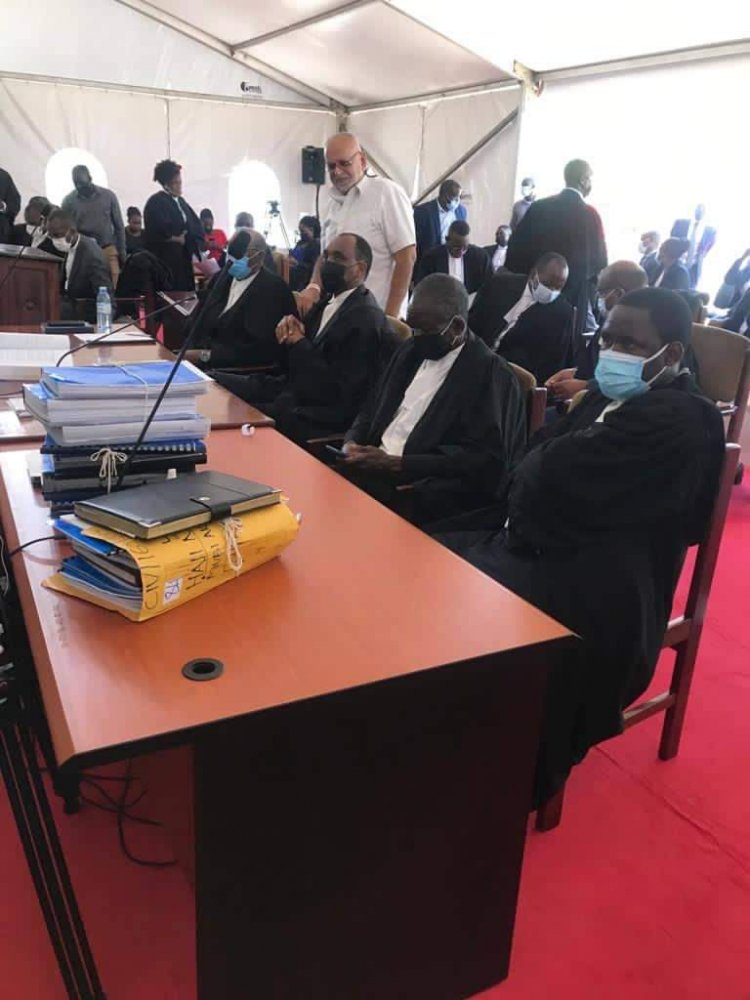Sudhir’s lawyers insist BOU must pay costs in the case with Meera Investments.
The Court first overruled the objection by the Central Bank that it is immune from being sued under the law governing commercial banks in the county, reasoning that the BoU must be sued for anything done in bad faith, including placing Crane Bank Ltd into liquidation.

Sudhir Ruparelia's laywers on Tuesday, November 9 insisted that the Bank of Uganda must pay costs of the long-running legal battle between the city businessman and his Meera Investments Ltd and the BoU, in the aftermath of the fallout resulting from the closure of Crane Bank Ltd.
A Supreme Court panel on Tuesday sat to listen to submissions of the lawyers of either party as the central bank insists that Crane Bank (In Receivership) should pay the costs.
However, Mr. Sudhir’s lead counsel Peter Kabatsi of the Kampala Associated Advocates says both the High Court and the Court of Appeal already decreed that the BoU must pay costs, which the central bank cannot run away from.
“It would cause great injustice if BoU lawyers turn around and say the shadow should pay the costs,” Mr. Katasi said, rejecting the arguments that the case had been withdrawn.
The Supreme Court in August this year, dismissed with costs, an application by lawyers representing the Bank of Uganda in which they sought to substitute the court record from Crane Bank Ltd (in receivership) to Crane Bank Ltd (in Liquidation), with the court rejecting the move, as in bad faith and intended to circumvent facts.
The BoU later withdrew the suit, after suffering successive defeats at the hands of Mr. Sudhir’s lawyers.
A panel of the Supreme Court Justices including Ruby Opio-Aweri, Faith Mwondha, Lillian Tibatemwa, Ezekiel Muhanguzi and Night Tuhaise, in a ruling issued on August 12 rejected arguments by BoU lawyers led by veteran attorney the late Dr. Joseph Byamugisha, reasoning that Crane Bank Ltd (in Receivership), Crane Bank Ltd (in Liquidation), and Crane Bank Ltd are three distinct entities with different rights, powers and obligations.
Earlier in the High Court, Justice David Wangutusi noted in his ruling that at the time BoU and Crane Bank (in receivership) filed the suit against Mr Ruparelia and his Meera Investments in January 2017, Crane Bank Ltd was a non-existing entity, having been terminated when the Central Bank sold its assets to dfcu Bank in October 2016.
After a succession of serious legal defeats, the Supreme Court, on Monday, October 4, 2021 quashed attempts by the Bank of Uganda to hold on to the jurisdiction of the defunct Crane Bank Ltd, arguing that once the commercial bank was closed, it was no longer a financial institution and therefore outside the legal care of the central bank.
The Court first overruled the objection by the Central Bank that it is immune from being sued under the law governing commercial banks in the county, reasoning that the BoU must be sued for anything done in bad faith, including placing Crane Bank Ltd into liquidation.
The Court further found that changing the status of Crane Bank (in Receivership) to Crane Bank (in liquidation) would render the appeal before it moot and nugatory. The highest court in the land also issued a temporary injunction restraining Bank of Uganda, their agents or anyone acting under their authority from continuing with the liquidation process of Crane Bank (in receivership) pending the hearing and determination of Civil Appeal No. 7 of 2020.”Court also ordered that Crane Bank (in receivership) be maintained under receivership and that Bank of Uganda was in contempt of court by trying to progress Crane Bank (in receivership) into liquidation when there was an unresolved case in the matter of Crane Bank (in receivership).












